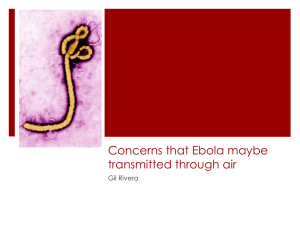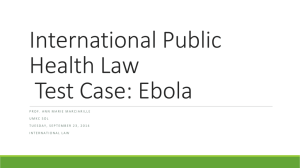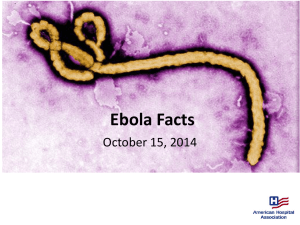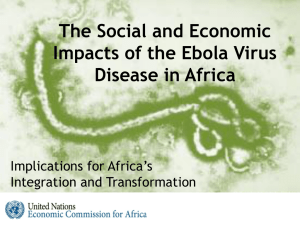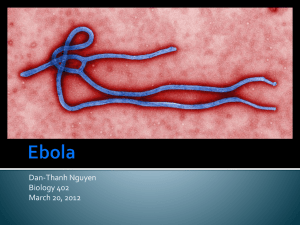Screening of travellers at airports
advertisement
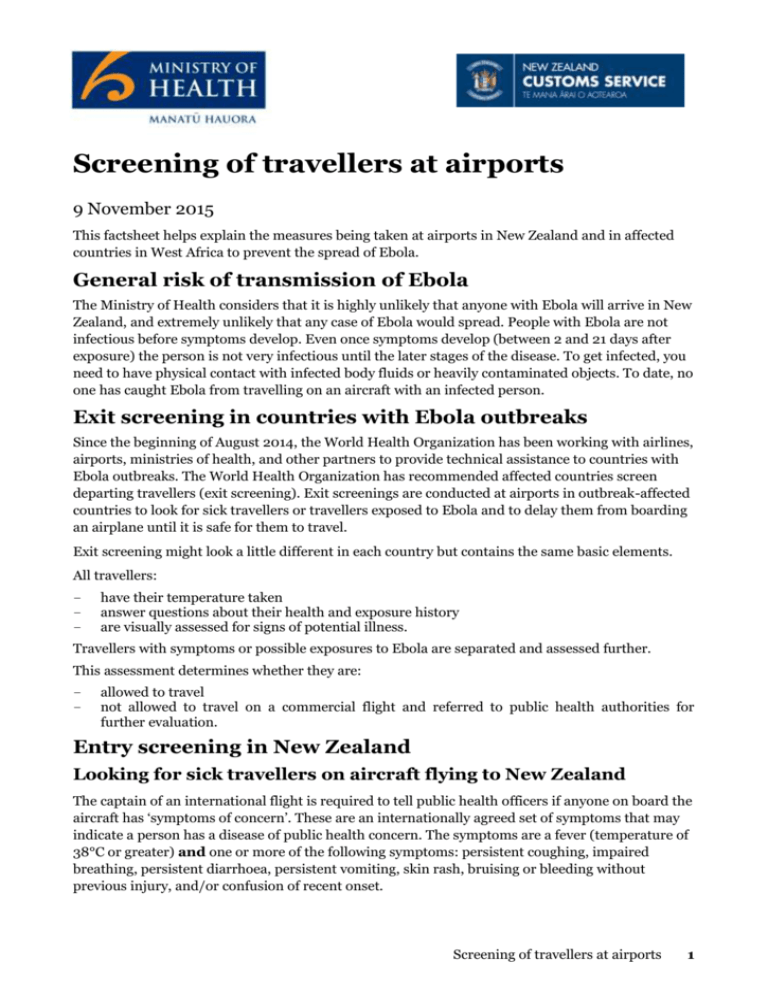
Screening of travellers at airports 9 November 2015 This factsheet helps explain the measures being taken at airports in New Zealand and in affected countries in West Africa to prevent the spread of Ebola. General risk of transmission of Ebola The Ministry of Health considers that it is highly unlikely that anyone with Ebola will arrive in New Zealand, and extremely unlikely that any case of Ebola would spread. People with Ebola are not infectious before symptoms develop. Even once symptoms develop (between 2 and 21 days after exposure) the person is not very infectious until the later stages of the disease. To get infected, you need to have physical contact with infected body fluids or heavily contaminated objects. To date, no one has caught Ebola from travelling on an aircraft with an infected person. Exit screening in countries with Ebola outbreaks Since the beginning of August 2014, the World Health Organization has been working with airlines, airports, ministries of health, and other partners to provide technical assistance to countries with Ebola outbreaks. The World Health Organization has recommended affected countries screen departing travellers (exit screening). Exit screenings are conducted at airports in outbreak-affected countries to look for sick travellers or travellers exposed to Ebola and to delay them from boarding an airplane until it is safe for them to travel. Exit screening might look a little different in each country but contains the same basic elements. All travellers: – – – have their temperature taken answer questions about their health and exposure history are visually assessed for signs of potential illness. Travellers with symptoms or possible exposures to Ebola are separated and assessed further. This assessment determines whether they are: – – allowed to travel not allowed to travel on a commercial flight and referred to public health authorities for further evaluation. Entry screening in New Zealand Looking for sick travellers on aircraft flying to New Zealand The captain of an international flight is required to tell public health officers if anyone on board the aircraft has ‘symptoms of concern’. These are an internationally agreed set of symptoms that may indicate a person has a disease of public health concern. The symptoms are a fever (temperature of 38°C or greater) and one or more of the following symptoms: persistent coughing, impaired breathing, persistent diarrhoea, persistent vomiting, skin rash, bruising or bleeding without previous injury, and/or confusion of recent onset. Screening of travellers at airports 1 Once the captain reports an ill passenger, the public health officers will make sure the sick person is assessed and referred for treatment. They will then talk to the people on the aircraft to identify anyone travelling with the patient and anyone else who may have had contact with the patient. Looking for sick travellers at New Zealand airports Because of the Ebola outbreak, the Ministry of Health and New Zealand Customs are undertaking additional entry screening of travellers who have travelled from or through the countries in West Africa which are affected by the Ebola outbreak: currently only Guinea. Our staff at all airports remain trained and ready to respond to any reports of ill travellers, and our robust public health system is prepared to respond and assist. What New Zealand entry screening looks like Customs officers are checking arrival cards and identifying travellers who list Guinea as a country visited in the past 30 days. Any travellers identified who have visited the Ebola-affected country will be asked the following questions by Customs officers. 1. Are you experiencing any symptoms of fever, muscle aches, vomiting or diarrhoea? 2. Have you been in direct contact with someone who has had Ebola or was suspected of having the disease? 3. Were you living in a household with someone who has had Ebola? 4. Were you providing medical care to an Ebola patient? 5. Were you working in a laboratory and having exposure to Ebola samples? 6. Have you attended a funeral? 7. Have you been involved in any capacity with the response to the Ebola outbreak? If the traveller answers ‘no’ to all seven questions, they will be given the Ministry of Health advice card. If the traveller answers ‘yes’ to any of these questions, the traveller will be isolated and public health officers will undertake a health assessment of the traveller to see if they meet the case definition, may be a contact of a suspected case, or require further public health follow-up. If the Customs officer has any cause for concern, regardless of the responses to these questions, they will seek advice from their local public health unit. People who may have been in contact with Ebola People who may have been in contact with an Ebola case in the affected country, or on an aircraft, will be given information about the disease by a public health officer. The travellers will be assessed to see how they may have been exposed and how likely it is that they may get sick. If necessary, they will be asked to take their temperature twice a day, and will be visited or phoned each day by a public health officer to see how they are feeling. Public health officers can also place people in quarantine if needed. For further background information on Ebola see www.health.govt.nz/ebolaguidance HP6065 Screening of travellers at airports 2

